Tanganyika
In 1885, the German Empire declared its intent to establish a protectorate in the area, named German East Africa (GEA). When the Sultan of Zanzibar objected, German warships threatened to bombard his palace. Britain and Germany then agreed to divide the mainland into spheres of influence, and the Sultan was forced to acquiesce.
Maji Maji Rebellion 1905 – 1907
The Maji Maji Rebellion (German: Maji-Maji-Aufstand), sometimes called the Maji Maji Jihad or Maji Maji War (Swahili: Vita vya Maji Maji, Maji-Maji-Krieg), was an armed rebellion of Islamic and Animist Africans against German colonial rule in German East Africa (now Tanzania). The war was triggered by a German policy designed to force the indigenous population to grow cotton for export, The Germans brutally put down the rebellion resulting in 250,000–300,000 total dead, mostly civilians from famine.
When British Indian forces invaded during WW1 they found that German forces under the superb leadership of General Paul von Lettow-Vorbeck using guerilla hit and run tactics were able to evade British forces throughout the entire war, this tied up a considerable number of British troops and Von Lettow did not surrender until notified about the Armistice of 11 November 1918 that ended the war.
After Germany’s defeat, German East Africa was divided among the victorious powers under the Treaty of Versailles. Apart from Ruanda-Urundi which was assigned to Belgium and the small Kionga triangle given to Portuguese Mozambique, the territory was transferred to Britain who named it Tanganyika. The territory remained under British control until 1961 when it was granted independence and renamed Tanzania.
-
1919 TANGANYIKA – AUSTRALIA ..WW1 EAST AFRICA.. [22728]
 $125.00
Add to cart
More Info...
$125.00
Add to cart
More Info... -
1941 TANGANYIKA – SOUTH AFRICA..WW2 INTERNEE to INTERNEE… [19955]
 $150.00
Add to cart
More Info...
$150.00
Add to cart
More Info... -
1944 TANGANYIKA – USA.. POLISH RESETTLEMENT REFUGEE IFUNDA CAMP near IRINGA.. [22054]
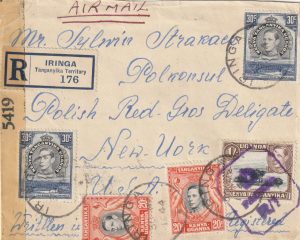 $550.00
Add to cart
More Info...
$550.00
Add to cart
More Info... -
1945 TANGANYIKA – USA..POLISH RESETTLEMENT REFUGEE IFUNGA CAMP near IRINGA.. [22053]
 $400.00
Add to cart
More Info...
$400.00
Add to cart
More Info... -
1941 EAST AFRICA (TANGANYIKA) – USA..WW2 CENSORED [22049]
 $40.00
Add to cart
More Info...
$40.00
Add to cart
More Info... -
1940 EAST AFRICA. KENYA – USA …WW2 CENSORED AIRMAIL with JUSQU’A… [22019]
 $65.00
Add to cart
More Info...
$65.00
Add to cart
More Info... -
1947 EAST AFRICA. TANGANYIKA – CHANNEL SLANDS … [22018]
 $45.00
Add to cart
More Info...
$45.00
Add to cart
More Info... -
1952 EAST AFRICA. TANGANYIKA – SOUTH AFRICA …REGISTERED TPO.. [22017]
 $45.00
Add to cart
More Info...
$45.00
Add to cart
More Info... -
1917 TANGANYIKA – CHINA…WW1 OCCUPIED GERMAN EAST AFRICA… [21327]
 $225.00
Add to cart
More Info...
$225.00
Add to cart
More Info... -
1917 TANGANYIKA – CHINA…WW1 OCCUPIED GERMAN EAST AFRICA… [21328]
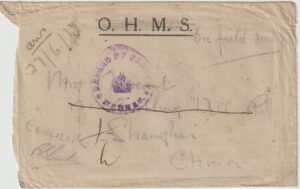 $225.00
Add to cart
More Info...
$225.00
Add to cart
More Info... -
1918 TANGANIYKA – CHINA…WW1 OCCUPIED GERMAN EAST AFRICA… [21326]
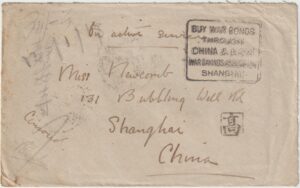 $375.00
Add to cart
More Info...
$375.00
Add to cart
More Info... -
1918 SWITZERLAND – TANGANYIKA …WW1 GERMAN POW… [21312]
 $325.00
Add to cart
More Info...
$325.00
Add to cart
More Info... -
1917 TANGANYIKA – UGANDA..WW1 EAST AFRICA CAMPAIGN INTERNAL MAIL… [21284]
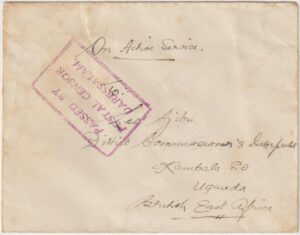 $200.00
Add to cart
More Info...
$200.00
Add to cart
More Info... -
1917 TANGANYIKA – GB..WW1 EAST AFRICA CAMPAIGN… [21283]
 $100.00
Add to cart
More Info...
$100.00
Add to cart
More Info... -
1946 TANGANYIKA – ITALY…1946 ITALIAN EVACUEE CAMP.. [21190]
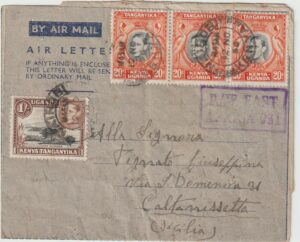 $300.00
Add to cart
More Info...
$300.00
Add to cart
More Info... -
1941 TANGANYIKA – SOUTH AFRICA..CENSORS OFFICE TANGA from INTERNEE to INTERNEE… [19954]
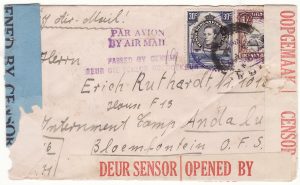 $150.00
Add to cart
More Info...
$150.00
Add to cart
More Info... -
1941 TANGANYIKA – SOUTH AFRICA..CENSORS OFFICE TANGA to INTERNEE [19626]
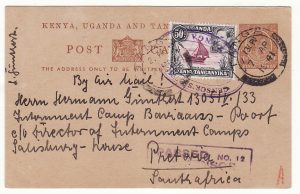 $500.00
Add to cart
More Info...
$500.00
Add to cart
More Info... -
1944 TANGANYIKA – USA…WW2 DOUBLE CENSORED TANGANYIKA & RHODESIA.. [20374]
 $130.00
Add to cart
More Info...
$130.00
Add to cart
More Info... -
1946 TANGANYIKA – ITALY..WW2 ITALIAN EVACUEE CAMP 1… [19957]
 $250.00
Add to cart
More Info...
$250.00
Add to cart
More Info... -
1946 TANGANYIKA – ITALY..WW2 ITALIAN EVACUEE CAMP TABORA… [19956]
 $350.00
Add to cart
More Info...
$350.00
Add to cart
More Info... -
1942 TANGANYIKA – ITALY..WW2 ITALIAN EVACUEE’S CAMP TABORA… [19951]
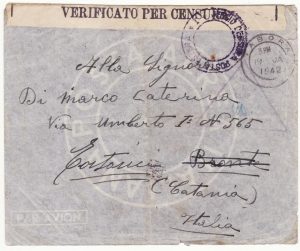 $350.00
Add to cart
More Info...
$350.00
Add to cart
More Info... -
1946 TANGANYIKA – ITALY..WW2 POSTAGE FREE EVACUEE MAIL… [19950]
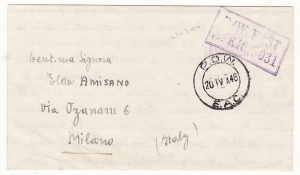 $170.00
Add to cart
More Info...
$170.00
Add to cart
More Info... -
1945 TANGANYIKA – ITALY..WW2 EVACUEE CAMP No. 1 at TABORA… [19948]
 $130.00
Add to cart
More Info...
$130.00
Add to cart
More Info... -
1941 TANGANYIKA – USA…WW2 OLD SHINYANGA CONCENTRATION CAMP… [19943]
 $250.00
Add to cart
More Info...
$250.00
Add to cart
More Info...

